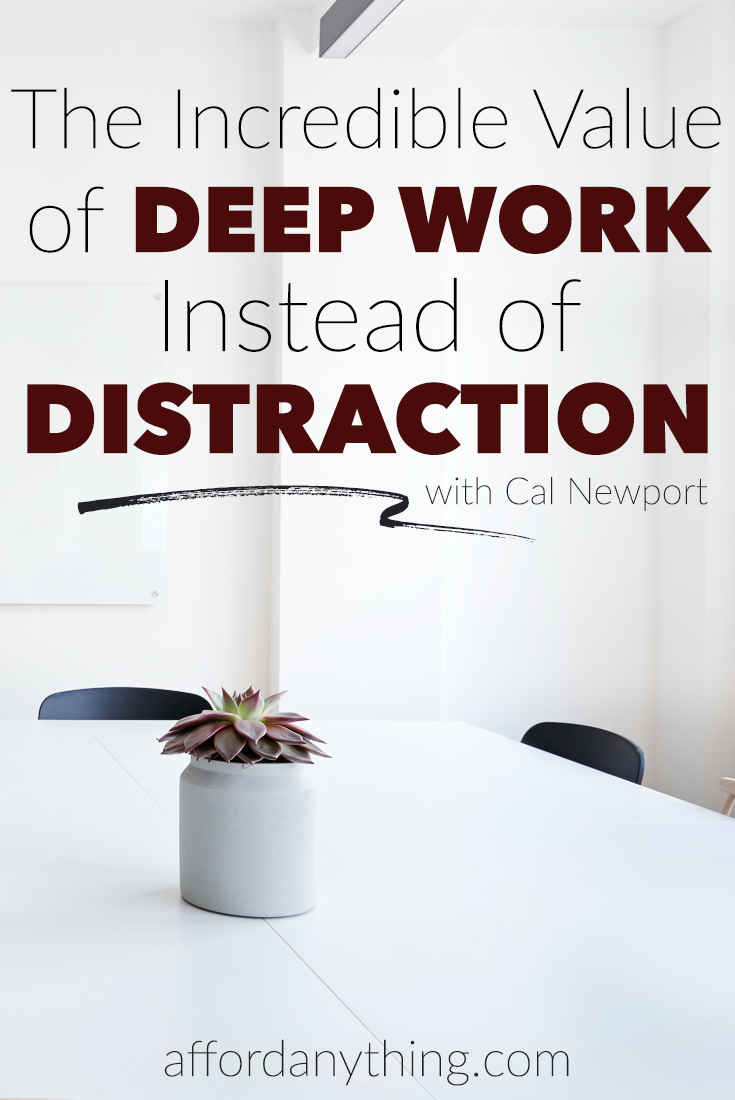[click_to_tweet tweet=”You can’t hack your way into influence, impact and meaning. – Cal Newport” quote=”You can’t hack your way into influence, impact and meaning. – Cal Newport”]
Your most valuable asset isn’t your house, car or retirement portfolio. It’s your attention.
Most knowledge workers spend their day frantically hopping between meetings, emails, phone calls and social media.
But that’s not the best way to stand out in the modern economy.
Emails are necessary, says author and professor Cal Newport. They’ll keep you from getting fired. But they won’t get you promoted.
In fact, his Deep Work Hypothesis states that the ability to do deep work is becoming more rare, yet at the same time, more valuable.
That means if you can train your mind to resist the common distractions we all face, you’ll become more valuable in the workplace, whether you’re self-employed or traditionally employed.
The problem, however, is that most of us are intimidated by deep work. We welcome distractions from difficult tasks that take a toll on our brain power.
How can you re-arrange your life to enhance Deep Work? Here are a few tips:
#1: Recognize that every hour you spend on “shallow work” is an hour that you’re not spending on deep, rare, valuable work.
#2: Don’t just focus on “cutting” — chopping email, cutting social media. That’s a good start, but it’s not enough.
Instead, ask the question: “What’s the ideal deep work vs. shallow work ratio?” — how many hours should I spend on each one? — and structure your workday accordingly.
For example, you might decide to spend your time 50/50 on deep vs. shallow work. If that’s your ideal arrangement, you might spend the first four hours of your workday — 8 am to 12 noon — invested in deep work. Then take a break for lunch, and spend the second half of your workday — 1 pm to 5 pm — answering emails, participating in meetings, etc.
Alternately, you could break up your deep work into chunks — 8 am to 10 am, then 3 pm to 5 pm. Use the 10 am – 3 pm stretch for the necessary shallow work of emails, meetings and phone calls.
As a third option, you might block off 2.5 days per week for deep work, and devote the other 2.5 days to shallow work.
However you arrange the workday, the most important takeaway is that you consciously choose your ideal deep-to-shallow ratio, and then structure your time accordingly.
#3: Let go of the “Any Benefit” decision-making model, in which you’ll invest time into any social media platform, app or tool that may provide some benefit.
Recognize that many tools might provide benefits, but each tool contains a serious time and energy cost. Therefore, you shouldn’t adopt a new tool, app or social media platform unless you’re convinced it’ll create demonstrable value.
Deep work also isn’t something that you cram into the margins of your life. To the contrary, focusing on deep work allows you to boost your productivity at work and feel more fully present at home.
Newport discusses the concept of Deep Work, and shares tips on how to apply this to our lives, in today’s podcast. Enjoy!
— Paula
Resources Mentioned:
- Deep Work: Rules for Focused Success in a Distracted World
- So Good They Can’t Ignore You: Why Skills Trump Passion in the Quest for Work You Love
_________________
Deep work is even more important for freelancers and entrepreneurs who need to manage their time well enough to produce great quality work for their clients. But in order to get paid, you need to spend time invoicing clients, which can easily turn into a distraction.
Enter: Freshbooks, an online platform featuring an easy, intuitive invoicing system designed for solopreneurs, freelancers and self-employed hustlers. They’re also an enthusiastic supporter of this podcast.
Try them for FREE — no credit card required! — by visiting Freshbooks.com/paula. When they ask how you learned about them, please mention the Afford Anything podcast. Thank you for your support!

